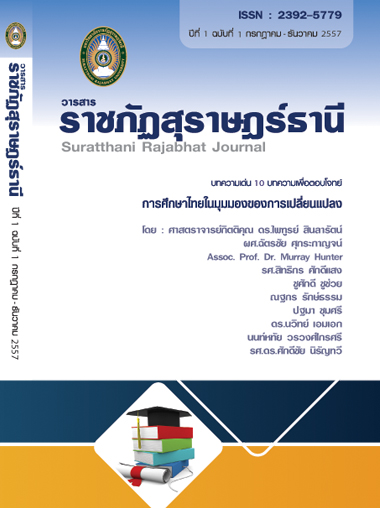Causal Factors Affecting Teachers’ Empowerment in School under Primary Education Service Area Office in the South
Main Article Content
Abstract
The purposes of this research were to 1) construct a linear structural relationship model, to study direct, indirect, and total effects of a linear structural relationship model of causal factors affecting the teachers’ empowerment. The sample of 359 teachers in basic school in the south. The instrument was a questionnaire. The methods of data analysis were percentage, mean, standard deviation, and path analysis by applied program. 2) to study guidelines for the teachers’ empowerment working in schools. The experts are school administrators, educational supervisors, and teachers. The instrument was a semi-structured interview. Data were analyzed by content analysis. The research results were as follows: 1. A linear structural relationship model has index of the goodness of fit with the empirical data, and teachers’ empowerment directly influenced the motivation for work, the teacher leadership and the organizational climate, and indirectly through the motivation for work such as the teacher leadership and the organizational climate, the total effects such as the teacher leadership, the motivation for work and the organizational climate 2. Guidelines for the teachers’ empowerment working in schools. It indicated that mentioned above three interviewed agreed with the findings of three aspects : the motivation for work Should be used to enhance the performance of teachers in the teaching and learning activities. The teacher leadership should be used to enhance the performance of teachers to school administrators. And the organizational climate should be used to enhance the performance of teacher supervision in the field of education.
Article Details
References
นงลักษณ์ วิรัชชัย. (2542). โมเดลลิสเรล : สถิติวิเคราะห์สำหรับการวิจัย. พิมพ์ครั้งที่ 3. กรุงเทพฯ : โรงพิมพ์แห่งจุฬาลงกรณ์มหาวิทยาลัย.
ประวิต เอราวรรณ์. (2548). การพัฒนารูปแบบการเสริมสร้างพลังอำนาจครูในโรงเรียน : กรณีศึกษาโรงเรียนสาธิตมหาวิทยาลัยมหาสารคาม. วิทยานิพนธ์การศึกษาดุษฎีบัณฑิต สาขาวิชาการวิจัยและการพัฒนา บัณฑิตวิทยาลัย มหาวิทยาลัยศรีนครินทรวิโรฒ.
ปิลัญ ปฏิพิมพาคม. (2550). รูปแบบภาวะผู้นำและประสิทธิผลของผู้บริหารสถานศึกษาเอกชน ระดับการศึกษาขั้นพื้นฐาน. วิทยานิพนธ์ปรัชญาดุษฎีบัณฑิต สาขาวิชาการบริหารการศึกษา บัณฑิตวิทยาลัย มหาวิทยาลัยศิลปากร.
สำนักงานเลขาธิการสภาการศึกษา. ความสามารถในการแข่งขันของประเทศไทยจาก World Competitiveness Yearbook (IMD) 2011. แหล่งที่มา URL : http://onec.go.th/onec_backoffice/uploaded/
Category/DepOpCenter/2011-Oct-11-SumIMD2011.pdf.
1 กันยายน 2555.
สถาพร บุตรใสย์. (2549). อิทธิพลของกระบวนการเสริมสร้างพลังอำนาจที่มีต่อพลังอำนาจครู. วิทยานิพนธ์ครุศาสตรมหาบัณฑิต สาขาวิชาการบริหารการศึกษา บัณฑิตวิทยาลัย จุฬาลงกรณ์มหาวิทยาลัย.
สมจิต สงสาร. (2552). การพัฒนาตัวแบบความสัมพันธ์โครงสร้างเชิงเส้นของปัจจัยที่มีอิทธิพลต่อการเสริมสร้างพลังอำนาจการทำงานที่มีประสิทธิผลของครู. วิทยานิพนธ์ศึกษาศาสตรดุษฎีบัณฑิต สาขาวิชาการบริหารการศึกษา บัณฑิตวิทยาลัย มหาวิทยาลัยขอนแก่น.
อาภรณ์ รัตน์มณี. ทำไมการศึกษาไทยจึงพัฒนาช้า. แหล่งที่มา URL : http://www.mcu.ac.th/site/articlecontent_desc.php.
29 มกราคม 2555.
Hopkins, D. (2001). School Empowerment for Real. Journal of Health Care Management Review, 26 (3), 1-21.
Laschinger, H. K. ; Finegan, J. & Shamine, J. (2001). The Impact of Workplace Empowerment, Organizational Trust on Staff Nurses’ Work Satisfaction and Organizational Commitment. Journal of Health Care Management Review, 26 (3), 1-21.
Smith, J. (1996). Empowering People: How to Bring Out the Best in Your Workforce. London : Kogan Page.
Thomas, K. W. (2000). Intrinsic Motivation at Work: Building Energy & Commitment. San Francisc


